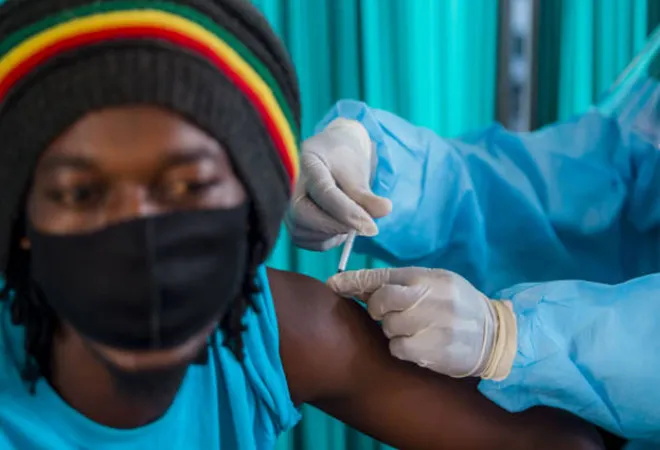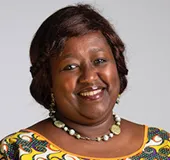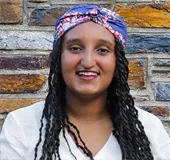-
CENTRES
Progammes & Centres
Location
The lessons learnt from COVID-19 management and vaccine distribution challenges
 This article is part of the series The COVID-19 Vaccine Challenge: Contextual and Country Analysis.
This article is part of the series The COVID-19 Vaccine Challenge: Contextual and Country Analysis.
The COVID-19 pandemic has served as a critical reminder that health is not a commodity but a human right that, if left unprotected, has severe negative repercussions for the overall functioning of our societies. In addition to threatening the health of all across the globe and resulting in the death of over 4 million people, SARS-COV-2 has indirectly stalled our economies, disrupted the delivery of ordinary health services, interrupted the schooling of millions of children and has increased pre-existing inequities. This was largely due to the inability of many governments to protect the right to health through effective and inclusive public health measures. This colossal failure is ever more evident from the inequitable distribution of COVID-19 vaccines.
The vaccine development process was initially a story of hope and an example of the potential of human solidarity. Despite signs of nationalism and acts of piracy over PPE, medicines and equipment early in the pandemic, there was hope that global solidarity would prevail as countries committed to the COVAX initiative. As the first initiative of its kind to commit to equitable distribution of vaccines even before one was discovered, members of COVAX agreed to vaccinate 20 percent of each country’s population, with priority being given to healthcare providers.
Despite signs of nationalism and acts of piracy over PPE, medicines and equipment early in the pandemic, there was hope that global solidarity would prevail as countries committed to the COVAX initiative.
Unfortunately, this flicker of hope was extinguished as quickly as it had been kindled. Countries bypassed COVAX through bilateral deals and raced to secure more than 100 percent, and in some cases up to 500 percent, of the vaccines needed for their own populations. By the end of 2021, high-income countries (HICs) are expected to have an excess of 1 billion doses while low-income countries will only be fully vaccinated by 2023. COVAX faces several challenges such as funding gaps and shortfalls in vaccines, notably when the second wave in India stalled exports of vaccines from the Serum Institute of India. While several countries are making plans to donate vaccines either through COVAX or bilaterally, we are a long way from vaccinating at-risk groups in low-income countries. Currently, only 1 percent of people in low-income countries have received at-least one dose.
However, given the nature of the virus and the need to vaccinate 70 percent of the global population to reach herd immunity, this nationalist move of HICs is starting to backfire. Scientists have warned from the first quarter of 2020 that unless we distribute vaccines to all corners of the globe, the emergence of variants will undermine any progress made in HICs. Now, in the third quarter of 2021, despite high rates of vaccination in HICs, the world is facing the emergence of deadlier and more transmissible variants such as the Delta variant, first identified in India. This variant is causing new waves across the world and is responsible for almost all current COVID-19 deaths in the US and the UK. The impact of such variants will likely be more disastrous in low-income countries whose populations lack access to vaccines. Unfortunately, the emergence of a variant against which none of the current vaccines will be effective will not come as a surprise. That day, leaders in HICs will think about what we repeatedly told them—that the only way to protect the world is to first vaccinate healthcare professionals and the vulnerable around the world.
Scientists have warned from the first quarter of 2020 that unless we distribute vaccines to all corners of the globe, the emergence of variants will undermine any progress made in HICs.
Rwanda is a low-income country that has done all in its capacity to control the spread of the COVID-19 pandemic. Rwanda was ranked number six in its ability to prepare for and respond to the pandemic by the Lowey Performance Index. This is the result of effective public health measures such as lockdowns, washing hands, social distancing, mask wearing, and prohibition of mass gatherings that were implemented strictly, some well before the report of the first case on 14 March 2020. At the same time, the government identified vulnerable households and provided food and financial support to mitigate the economic impact of such restrictive public health measures. Moreover, Rwanda provided clear and consistent information, building on the high trust of the population in the health system. Reliance on scientific evidence in the decision-making process and the avoidance of COVID-19 politicisation allowed the government to enforce public health measures and alter them as the situation in the country changed. This is unlike in developed countries such as the US where leaders politicised COVID-19 preparedness and response. This explains why the burden of COVID-19 in the US is reflective of the political affiliation of the states’ governors.
Rwanda provided clear and consistent information, building on the high trust of the population in the health system.
However, vaccines are now going to make the difference. You can only contain the virus for so long with effective evidence-based interventions, but only vaccines will pay off in the long-run. Rwanda is an example of a low-income country which has effectively and equitably distributed the little amount of available vaccines to its population, prioritising healthcare providers, the elderly, individuals with underlying conditions, individuals in crowded conditions such as refugees and prisoners as well as essential workers. However, Rwanda has only vaccinated 3 percent of its populations due to inequitable distribution of available doses. Like other low- and middle-income countries (LMICs), Rwanda grapples with what will likely be more disastrous waves.
There are important lessons we can take from this pandemic. In the short term, we need an immediate increase of available vaccines in Low and Middle Income Countries (LMICs). We need to convince HICs to donate their extra doses to COVAX before the expiration date, informing recipient countries now so they can prepare for national distribution. We also need to support the manufacturing of more vaccines in current production sites and produce more raw materials.
For the mid- to long- term, there are several lessons we can draw. First, we need to create new vaccine manufacturing sites in LMICs, especially in Africa—a continent which currently imports 99 percent of its vaccines—to prevent having to wait for the rest of the world to be served first. This move towards self-sufficiency requires strong political commitment, human resource development, investment in infrastructure, private sector involvement, and strengthening of regulatory capacity. This is now possible because there is political will on the continent to invest in such production and commitment from political leaders in the US and the UK to support the COVID-19 TRIPS waiver, all thanks to global activism. We need to build on this momentum and continue advocating for the implementation of the waiver and technology transfer, without which LMICs will not be able to produce these vaccines.
Second, scientific evidence needs to be at the centre of all decision-making to improve health outcomes. Government negligence and unwillingness to follow scientific evidence for political reasons has caused millions of unnecessary deaths. We need to hold governments responsible for their actions, especially when they were informed of the risks of COVID-19 but chose to ignore them. They should be held accountable for crimes against humanity for massive murders.
Government negligence and unwillingness to follow scientific evidence for political reasons has caused millions of unnecessary deaths.
Third, leaders need to adopt an equity approach and address the impact of health threats on vulnerable communities, keeping in mind that the COVID-19 pandemic has not created but has exacerbated existing inequities.
The lessons learned from the COVID-19 pandemic highlight key strategies that need to be implemented to effectively and equitably protect the right to health. It is only by doing so that we can prevent another disastrous health crisis from taking an immeasurable toll on human development.
The views expressed above belong to the author(s). ORF research and analyses now available on Telegram! Click here to access our curated content — blogs, longforms and interviews.

Professor Agnes Binagwaho MD M(Ped) PHD is the Vice Chancellor and co-founder of the University of Global Health Equity an initiative of Partners in Health. ...
Read More +
Kedest Mathewos is a research associate to Prof. Agnes Binagwaho the vice chancellor of the University of Global Health Equity (UGHE). Before joining the UGHE ...
Read More +